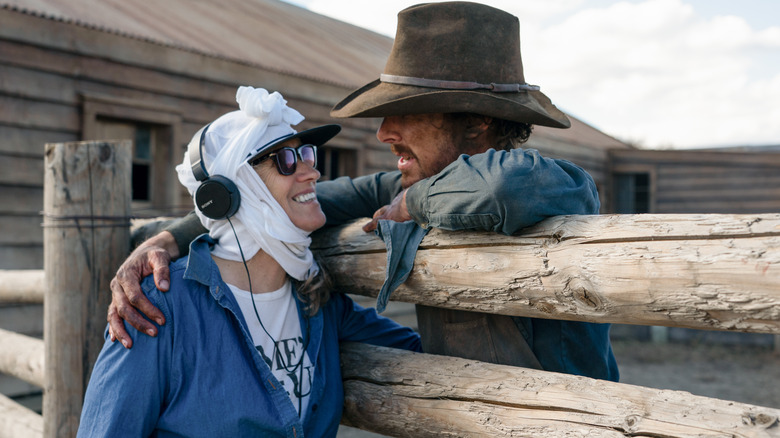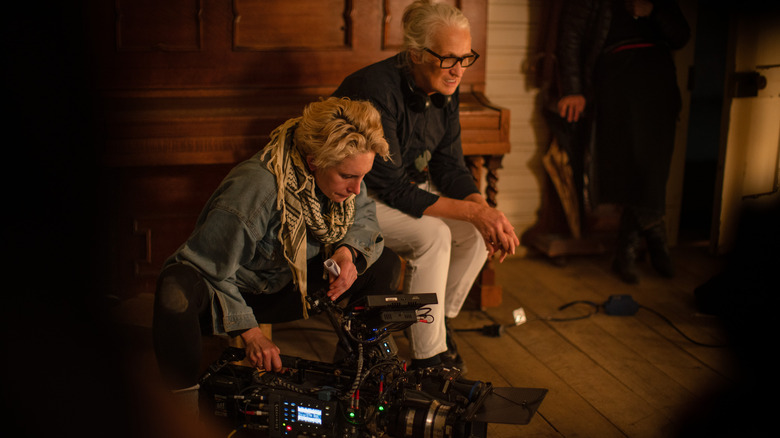Jane Campion's Filmmaking Method Comes Down To One Word
Thanks to "The Power of the Dog" and its surprisingly strong showing at this year's Oscars (to a certain extent, at least), the work of Jane Campion has reached viewers on a much larger scale, despite decades of quietly impressive work throughout several of her films that came before.
Those who've followed the filmmaker's storied career remain well aware of the fact that the Benedict Cumberbatch-starring film (with equally as impressive performances from actors Kirsten Dunst, Jesse Plemons, and Kodi Smit-McPhee) is certainly no outlier in terms of carefully constructed morality plays, tense and even suffocating character dynamics, and a filmmaking aesthetic with a quiet sense of reserve that belies the turbulent emotions running just underneath the surface. Observant and curious viewers have been drawn to (and rewarded by) Campion's work, from 1993's "The Piano" to 2003's "In the Cut" and beyond, with the director seemingly delivering at least one genuinely great and downright unforgettable feature like clockwork.
As with any storyteller held up as an auteur, Campion's oeuvre has always spurred movie fans into attempting to find a common thread between each and every one of her efforts. Christopher Nolan has his obsession with time, Quentin Tarantino will forever try to rewrite history as he sees fit ... but what about Jane Campion?
The answer to that question, fittingly enough, comes from a trusted source who'd know better than anyone else: herself.
'It is what brings me to my vulnerability'
On the face of it, Campion's work might not suggest any sort of strong shared link between them. "The Piano" stars Holly Hunter as Ada, a mute housewife shipped off to New Zealand in the 1800s in order to remarry a cold and distant man (Sam Neill). With nothing but her young and inquisitive daughter (played by Anna Paquin) and a few belongings in hand, nothing is more important to her than her cherished piano, which eventually leads to a simmering affair with another man (Harvey Keitel). "In the Cut" takes the form of an erotic psychological thriller, following Meg Ryan as Frannie, who finds herself in uncomfortably close proximity to several murders and irresistibly drawn to the brash police detective (Mark Ruffalo) investigating them. 2009's "Bright Star," meanwhile, chronicles the burgeoning romance between the poet John Keats (Ben Whishaw) and Fanny Brawne (Abbie Cornish).
So what's the commonality that bridges the gaps between "The Power of the Dog," a story about a trio of homesteaders struggling to deal with the toxic and overbearing presence of Cumberbatch's cowboy Phil Burbank, and the rest of her filmography? Well, Campion summed it up herself in a profile with The New York Times: tenderness. When asked why she resorts to using that specific word so often through the course of the interview, the director said, "Tenderness is very important to me." As she goes on to explain:
"Because it is what brings me to my vulnerability, I guess. And I feel like that's probably a hard place for me to go to, and it is the place where I feel most touched by life. I guess it's the leading edge, you know, of my experience."
Vulnerability through tenderness. Though maybe not as apparent as some other filmmakers, that's probably the most succinct window into Campion's chief concerns as a storyteller. Personally, I can't wait to see how — or even if — that continues with whatever story she chooses to tell next.

